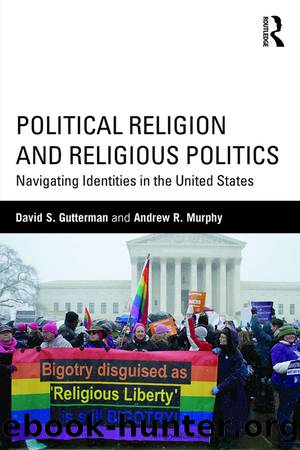Political Religion and Religious Politics: Navigating Identities in the United States (Routledge Series on Identity Politics) by David S. Gutterman & Andrew R. Murphy

Author:David S. Gutterman & Andrew R. Murphy [Gutterman, David S. & Murphy, Andrew R.]
Language: eng
Format: epub
ISBN: 9781136339233
Google: zEcBkAEACAAJ
Amazon: B016MUE5JI
Goodreads: 31692358
Publisher: Routledge
Published: 2015-10-14T00:00:00+00:00
Rodgers traces the rise of neoliberal â[f]aith in the wisdom and efficiency of markets, disdain for big government taxation, spending, and regulation, reverence for a globalized world of flexible labor pools, free trade, and free-floating capitalâ (2011, 75) to a position of almost unchallenged hegemony in the final quarter of the twentieth century.
In its refusal to locate the roots of dehumanization and oppression in institutional structures of domination, and in its insistence that individual benefits and prosperity will flow from faith and positive thinking, neoliberalization prosperity theology turns traditional liberation theology, and prophetic religion more generally, on its head. Such an orientation is a far cry, of course, not simply from the politically progressive, community-oriented tendencies within the American mainline during recent decades, but also from Roman Catholic liberation theology, with its Marxist-inflected analysis of structures of power (Berryman 1986; Boff 1987; Gutiérrez 1973), and the prophetic Protestantism of the American black church (Hollinger 2013; Lincoln and Mamiya 1990). As such, the Prosperity Gospel fits within broader scholarly conversations about neoliberalism and the neoliberal ideal of social life, which, according to William Davies (2014) represents âan attempt to remake social and personal life in its entirety, around an ideal of enterprise and performance.â It also illustrates Daviesâs claim that neoliberal impulses
targe[t] institutions and activities which lie outside of the market, such as universities, households, public administrations and trade unions ⦠to bring them inside the market, through acts of privatization; or to reinvent them in a âmarket-likeâ way; or simply to neutralize or disband them.
(Davies 2014)
Download
This site does not store any files on its server. We only index and link to content provided by other sites. Please contact the content providers to delete copyright contents if any and email us, we'll remove relevant links or contents immediately.
The Secret History by Donna Tartt(19053)
The Social Justice Warrior Handbook by Lisa De Pasquale(12187)
Thirteen Reasons Why by Jay Asher(8894)
This Is How You Lose Her by Junot Diaz(6877)
Weapons of Math Destruction by Cathy O'Neil(6266)
Zero to One by Peter Thiel(5787)
Beartown by Fredrik Backman(5737)
The Myth of the Strong Leader by Archie Brown(5500)
The Fire Next Time by James Baldwin(5431)
How Democracies Die by Steven Levitsky & Daniel Ziblatt(5216)
Promise Me, Dad by Joe Biden(5141)
Stone's Rules by Roger Stone(5081)
A Higher Loyalty: Truth, Lies, and Leadership by James Comey(4954)
100 Deadly Skills by Clint Emerson(4921)
Rise and Kill First by Ronen Bergman(4780)
Secrecy World by Jake Bernstein(4741)
The David Icke Guide to the Global Conspiracy (and how to end it) by David Icke(4709)
The Farm by Tom Rob Smith(4502)
The Doomsday Machine by Daniel Ellsberg(4484)
